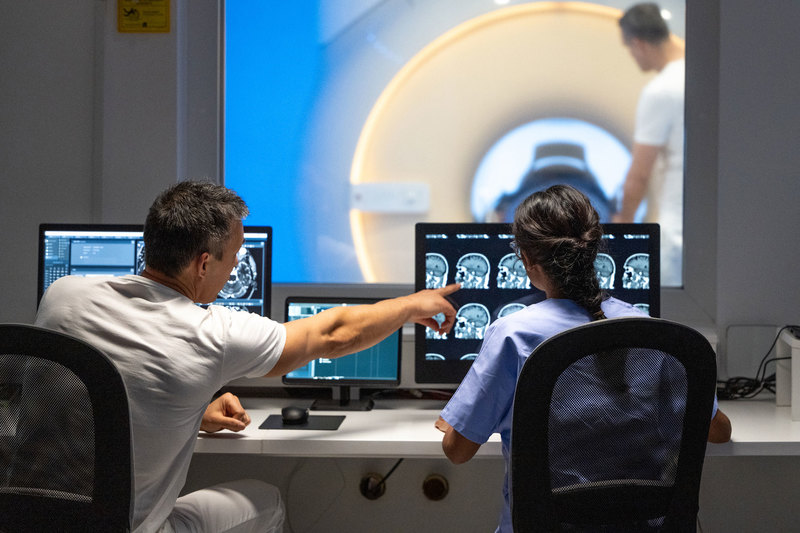Long-term neuropsychological outcomes in severe COVID-19
06 December 2021 | Story Supplied. Photo Getty Images. Read time 6 min.
In collaboration with Professor Mark Solms, who is the chair of neuropsychology at the Neuroscience Institute, University of Cape Town (UCT) alumnus Dr Donné Minné hopes to document cognitive and neuropsychiatric repercussions in a study funded by the National Research Foundation.
People who develop severe illness from COVID-19 have a much higher risk of neurological and mood-related disorders, particularly if they have been hospitalised. These effects have been linked to several pathological events in the body, including systemic inflammation, blood vessel changes, alterations in the blood–brain barrier, loss of oxygen to the brain and the consequences of mechanical ventilation. As a result, many patients suffer lasting difficulties with memory, concentration, low motivation, and anxiety.
“These symptoms pose a major challenge to independent living and general well-being, and are likely to heavily impact mental health,” said Dr Minné, who is a postdoctoral fellow and neuropsychologist who trained through UCT’s Department of Psychology.
Neurological ailments
Since early in the pandemic, neurological ailments have been observed and documented in a large proportion of critically ill COVID-19 patients; they include impaired consciousness, seizure, stroke and motor-neuron dysfunction, among others. Studies on neuropsychological outcomes (a branch of psychology that deals with how mental functions such as thoughts and feelings relate to specific brain correlates) have only come to light more recently. These show that severe infection with SARS-CoV-2 can lead to persisting deficits in memory, attention and executive functioning, and declines in the general speed at which an individual can process information.
Appropriate care – especially psychosocial support, to address the trauma and loss associated with brain injury – is a key part of the rehabilitation process.”
“Patients presenting with these symptoms might experience forgetfulness, difficulties with concentration, and trouble following conversations or finding the right words. This can feel disorienting and overwhelming. One consequence is that people tend to experience anxiety and might prefer to self-isolate. Fatigue is also very common in COVID-19 ICU survivors and can be debilitating. Appropriate care – especially psychosocial support, to address the trauma and loss associated with brain injury – is a key part of the rehabilitation process.”
Research undertaken prior to the COVID-19 pandemic shows that up to 40% of patients who require mechanical ventilation suffer cognitive impairment in the long term, and we should therefore expect similar outcomes in COVID-19 patients who develop acute respiratory distress syndrome. However, SARS-CoV-2 can also disrupt central nervous system functioning in patients who do not develop acute respiratory distress, suggesting multiple pathways of damage.
Studies and findings
In some older patients, evidence is emerging that a severe course of COVID-19 may exacerbate or even trigger progression to some forms of dementia. Risk factors for dementia, such as age, hypertension, diabetes and cardiovascular disease are also major predictors of COVID-19 severity. One common denominator in these risk profiles is inflammation. In fact, one of the major shifts in Alzheimer’s Disease research over the past decade has been a spotlight on the role of inflammation and dysregulation in immune-related pathways, as central events in the pathological cascade of neurodegeneration.
A study undertaken in the United Kingdom and published in the Journals of Gerontology showed that carriers of the ε4 allele of the APOE gene, which has been linked to Alzheimer’s Disease risk, were twice as likely to require hospitalisation for COVID-19 illness than people who were carriers of the more common APOE ε3 genotype. The APOE gene is mainly involved in the synthesis and storage of lipids; however, studies have shown it to be critical for biological processes linked to neuroprotection, such as the regulation of oxidative stress and inflammation. APOE ε4 is associated with increased inflammatory cytokine response. This suggests that carriers are more vulnerable to becoming critically ill from COVID-19, and this disease course might compound risk for dementia in the long term.
It is … important that studies include patients from different backgrounds, and assess cognition and mood much further down the line.”
While these findings are cause for concern, we should not be jumping to conclusions.
“There are still many unknowns regarding the nature and trajectory of neuropsychological outcomes following COVID‐19 infection. Most of the currently available knowledge comes from data collected from patients in Europe and the United States, during the very early phases in a person’s recovery. Yet recovery from brain injury can take up to two years, and is influenced by a number of individual factors, such as age, education and social support. It is therefore important that studies include patients from different backgrounds, and assess cognition and mood much further down the line.”
This collaborative study between Cape Peninsula University of Technology and UCT is taking place at the Neuroscience Institute at Groote Schuur Hospital in Observatory, Cape Town. All members of the public who have been hospitalised for COVID-19 are invited to take part. Participation will involve a two-hour visit to the Neuroscience Institute, during which time participants will undergo assessments of cognitive skills, such as memory and concentration, and be asked to share information relating to mood and emotions. All participants will receive reimbursement for travel costs and be entitled to a debriefing session to receive feedback on their results. To participate, please send an email to covidandthebrain@gmail.com.
 This work is licensed under a Creative Commons Attribution-NoDerivatives 4.0 International License.
This work is licensed under a Creative Commons Attribution-NoDerivatives 4.0 International License.
Please view the republishing articles page for more information.
UCT’s response to COVID-19
COVID-19 is a global pandemic that caused President Cyril Ramaphosa to declare a national disaster in South Africa on 15 March 2020 and to implement a national lockdown from 26 March 2020. UCT is taking the threat of infection in our university community extremely seriously, and this page will be updated with the latest COVID-19 information. Please note that the information on this page is subject to change depending on current lockdown regulations.
Minister of Health, Dr Joe Phaahla, has in June 2022 repealed some of South Africa’s remaining COVID-19 regulations: namely, sections 16A, 16B and 16C of the Regulations Relating to the Surveillance and the Control of Notifiable Medical Conditions under the National Health Act. We are now no longer required to wear masks or limit gatherings. Venue restrictions and checks for travellers coming into South Africa have now also been removed.
Read the latest document available on the UCT policies web page.
Campus communications
2022
UCT Community of Hope Vaccination Centre
On Wednesday, 20 July, staff from the University of Cape Town’s (UCT) Faculty of Health Sciences came together with representatives from the Western Cape Government at the UCT Community of Hope Vaccination Centre at Forest Hill Residence to acknowledge the centre’s significance in the fight against COVID-19 and to thank its staff for their contributions. The centre opened on 1 September 2021 with the aim of providing quality vaccination services to UCT staff, students and the nearby communities, as well as to create an opportunity for medical students from the Faculty of Health Sciences to gain practical public health skills. The vaccination centre ceased operations on Friday, 29 July 2022.
With the closure of the UCT Community of Hope Vaccination Centre, if you still require access to a COVID-19 vaccination site please visit the CovidComms SA website to find an alternative.
“After almost a year of operation, the University of Cape Town’s (UCT) Community of Hope Vaccination Centre, located at the Forest Hill residence complex in Mowbray, will close on Friday, 29 July 2022. I am extremely grateful and proud of all staff, students and everyone involved in this important project.”
– Vice-Chancellor Prof Mamokgethi PhakengWith the closure of the UCT Community of Hope Vaccination Centre, if you still require access to a COVID-19 vaccination site please visit the CovidComms SA website to find an alternative.
Frequently asked questions
Global Citizen Asks: Are COVID-19 Vaccines Safe & Effective?
UCT’s Institute of Infectious Disease and Molecular Medicine (IDM) collaborated with Global Citizen, speaking to trusted experts to dispel vaccine misinformation.
If you have further questions about the COVID-19 vaccine check out the FAQ produced by the Desmond Tutu Health Foundation (DTHF). The DTHF has developed a dedicated chat function where you can ask your vaccine-related questions on the bottom right hand corner of the website.
IDM YouTube channel | IDM website
“As a contact university, we look forward to readjusting our undergraduate and postgraduate programmes in 2023 as the COVID-19 regulations have been repealed.”
– Prof Harsha Kathard, Acting Deputy Vice-Chancellor: Teaching and Learning
We are continuing to monitor the situation and we will be updating the UCT community regularly – as and when there are further updates. If you are concerned or need more information, students can contact the Student Wellness Service on 021 650 5620 or 021 650 1271 (after hours), while staff can contact 021 650 5685.




















